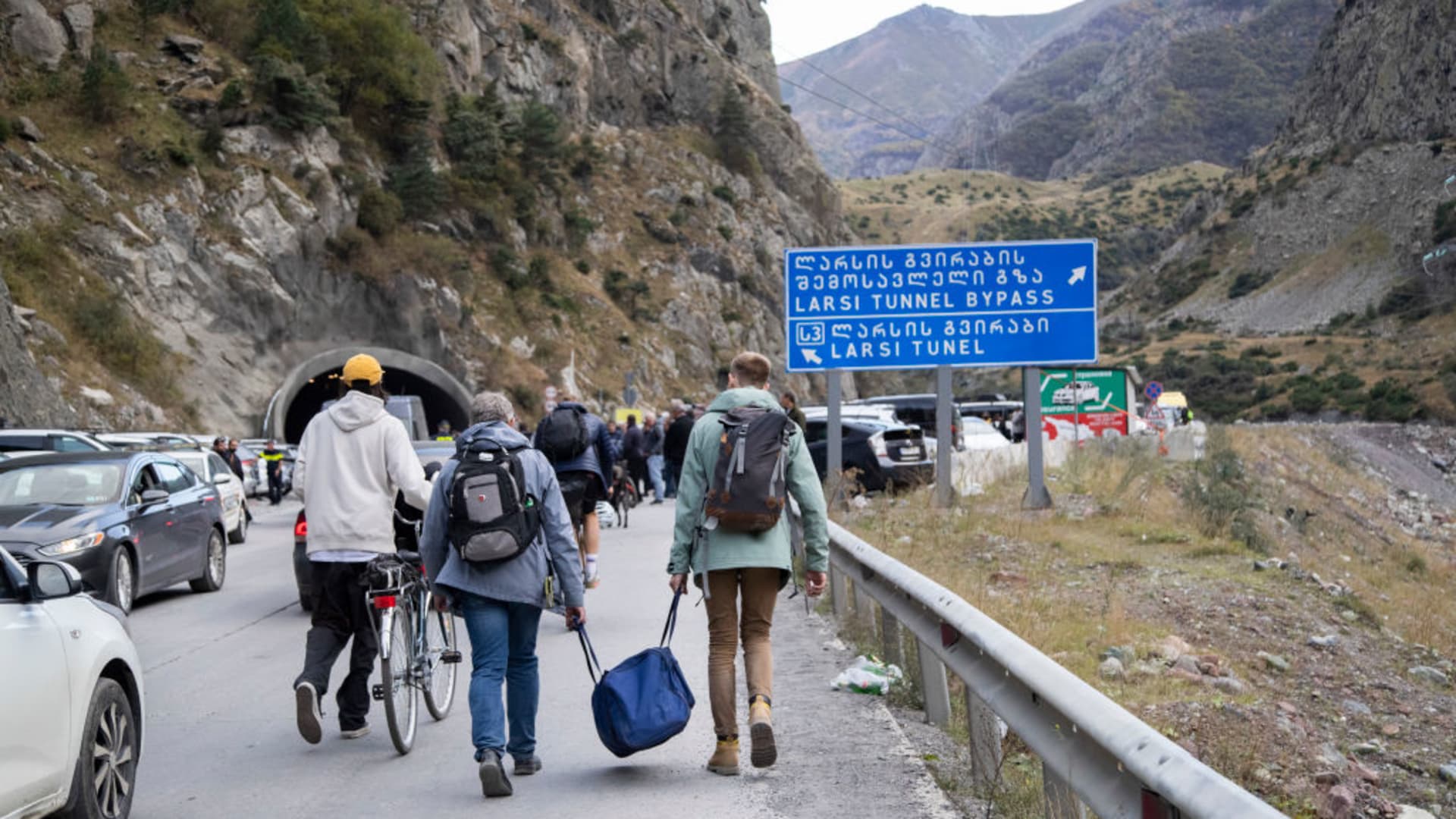These economies are booming as Putin’s war drives migrants and money out of Russia
Russians cross the border between Russia and Georgia days after President Vladimir Putin announced a mobilization drive on September 21.
Daro Sulakauri | Getty Images News | Getty Images
As many economies reel from the impact of Russia’s invasion of Ukraine, a select few countries are benefiting from an influx of Russian migrants and their accompanying wealth.
Georgia, a small former Soviet republic on Russia’s southern border, is among several Caucasus and surrounding countries, including Armenia and Turkey, to have seen their economies boom amid the ongoing turmoil.
At least 112,000 Russians have emigrated to Georgia this year, according to reports. A first wave of almost 43,000 arrived following Russia’s invasion of Ukraine on Feb. 24, while a second wave — whose number is harder to determine — entered after Putin’s military mobilization drive in September.
The country’s initial wave accounts for almost a quarter (23.4%) of all emigres out of Russia up to September, according to an online survey of 2,000 Russian migrants conducted by research group Ponars Eurasia. The majority of the remaining Russian migrants have fled to Turkey (24.9%), Armenia (15.1%) and uncited “other” countries (19%).
The influx has had an outsized impact on Georgia’s economy — already on the up following a Covid-19 slowdown — and the Georgian lari, which has risen 15% against a strong U.S. dollar so far this year.
We’ve had double-digit growth, which no one expected.
Mikheil Kukava
head of economic and social policy, Institute for Development of Freedom of Information
The International Monetary Fund now expects Georgia’s economy to grow by 10% in 2022, having revised up its estimate again this month and more than tripled its 3% forecast from April.
“A surge in immigration and financial inflows triggered by the war,” were among the reasons cited for the uptick. The IMF also sees fellow host country Turkey growing 5% this year, while Armenia is set to surge 11% on the back of “large inflows of external income, capital, and labor into the country.”
Georgia has benefitted from a dramatic surge in capital inflows this year, primarily from Russia. Russia accounted for three-fifths (59.6%) of Georgia’s foreign capital inflows in October alone — the total volumes of which rose 725% year-on-year.
Between February and October, Russians transferred $1.412 billion to Georgian accounts — more than four times the $314 million transferred over the same period in 2021 — according to the National Bank of Georgia.
Meanwhile, Russians opened more than 45,000 bank accounts in Georgia up to September, almost doubling the number of Russian-held accounts in the country.
‘Highly active’ migrants
Georgia’s strategic location and its historic and economic ties with Russia make it an obvious entry point for Russian migrants. Meanwhile, its liberal immigration policy allows foreigners to live, work and set up businesses without the need for a visa.
Like Armenia and Turkey, too, the country has resisted enforcing Western sanctions on the pariah state, leaving Russians and their money to move freely across its border.
Turkey, for its part, has granted residence permits to 118,626 Russians this year, according to government data, while one-fifth of its foreign property sales in 2022 have been by Russians. The Armenian government did not provide data on its migration figures or property purchases when contacted by CNBC.
Still, the economic impact has surprised even experts.
Both Ukrainian refugees and Russian emigres have fled to Georgia, a former Soviet republic with its own history of conflict with Russia, following that country’s Feb. 24 invasion of Ukraine.
Daro Sulakauri | Getty Images News | Getty Images
“We’ve had double-digit growth, which no one expected,” Mikheil Kukava, head of economic and social policy at Georgian think tank the Institute for Development of Freedom of Information (IDFI), told CNBC via zoom.
To be sure, a significant proportion of the uptick comes after growth was decimated during the coronavirus pandemic. But Kukava said it is also indicative of the economic activity of the new arrivals. And while an inflow of tens of thousands may appear minimal — even for a country like Georgia, with a modest population of 3.7 million — it is more than 10 times the 10,881 Russians who arrived through all of 2021.
“They’re highly active. 42,000 randomly selected Russian citizens wouldn’t have had this impact on the Georgian economy,” Kukava said, referring to the first wave of migrants, many of them wealthy and highly educated. The second wave, by comparison, were more likely to be motivated to leave by “fear,” he said, than economic means.
‘Boom turned bang’
One of the most visible impacts of the new arrivals has been on Georgia’s housing market. Property prices in the capital, Tbilisi, rose 20% year-on-year in September and transactions were up 30%, according to Georgian bank TBC. Rents soared 74% over the year.
Elsewhere, 12,093 new Russian companies were registered in Georgia from January and November this year, more than 13 times the total number set up in 2021, according to Georgia’s National Statistics Office.
The Georgian lari is now trading at a three-year high.
The Kremlin could use their presence as a pretext for further interference or aggression.
However, not everyone is enthusiastic about the new outlook for Georgia. As an ex-Soviet republic that fought a short war with Russia in 2008, Georgia’s relationship with Russia is complex, and some Georgians fear the socio-political impact the arrivals could have.
Indeed, Washington, D.C.-based think tank the Hudson Institute has warned that “the Kremlin could use their presence as a pretext for further interference or aggression.”
IDFI’s Kukava worries that could also mark a “boom turned bang” for the Georgian economy: “‘Boom turned bang’ is when the Russian plutocratic government and this pariah country comes after them,” he said, referring to Russian emigres. “That’s the basic concern in Georgia.”
“Even though they are not a threat per se,” Kukava continued, describing the majority of migrants as “new generation” Russians, “the Kremlin might use this as a pretext to come and protect them. That’s what outweighs any economic effect that might have.”
Bracing for a slowdown
Forecasters appear to be taking that uncertainty into account. Both the Georgian government and the National Bank have said they expect growth to slow in 2023.
The IMF also sees growth falling to around 5% next year.
“Growth and inflation are expected to slow in 2023, on the back of moderating external inflows, deteriorating global economic and financial conditions,” the IMF said in its note earlier this month.
“[That] indicates that the Georgian government does not expect they are going to stay,” Kukava said of the Russian arrivals.
According to Ponars Eurasia’s survey, conducted between March and April, less than half (43%) of Russian migrants said at the time that they planned to stay in their initial host country long term. Over a third (35%) were undecided, almost one-fifth (18%) intended to move elsewhere, and just 3% planned to return to Russia.
“We are better off — both the government and the National Bank — if we don’t base our economic assumptions on the basis that these people will stay,” Kukava added.


